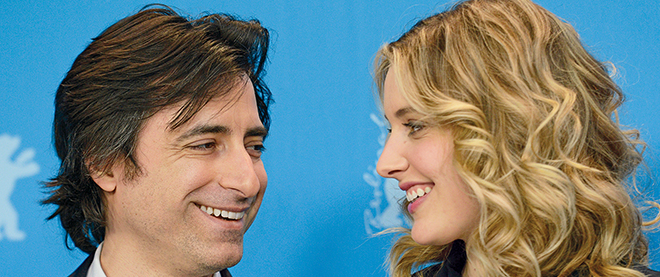Woody Allen 2.0: In conversation with half of Manhattan’s new It Couple
Noah Baumbach and Greta Gerwig are just like Woody and Diane, sort of
Gerard Julien/AFP/Getty Images
Share

In the title role of Frances Ha, Greta Gerwig plays a 27-year-old dancer who is broke, jobless and, by her own estimation, “undateable.” But when a tax refund arrives in the mail, she’s only too thrilled to take a man to dinner and pick up the cheque—until her credit card bounces. She then bolts from the restaurant, runs several blocks in search of an ATM machine, hesitates at the $3 fee before withdrawing $100, runs back, trips on the sidewalk, then tries to explain away the blood on her arm as she merrily pays for the meal.
Welcome to the world of Noah Baumbach, or Woody Allen 2.0, as some would have it. With Frances Ha, the tale of a New York neurotic shot in licorice-rich black-and-white, the Oscar-nominated director of The Squid and the Whale virtually invites comparisons to Allen’s Manhattan. And Gerwig has a guileless charm and skittish candour that recalls the young Diane Keaton. She also happens to be the director’s girlfriend. But don’t go calling her his muse: She co-wrote the movie with him. “As a muse, the implication is that you’re the inspiration, not the creator,” says Gerwig, on the phone from New York. “If people ask, ‘Is this film a love letter to you?’ If I was writing a love letter to myself, yes!”
Gerwig, 29, and Baumbach, 43, are boho Manhattan’s new It Couple, who can soak up the scrutiny of a joint 8,000-word New Yorker profile while treating fame as merely tolerable. Not unlike Allen. And they don’t mind working in his shadow. “His influence is hard to measure because it runs so deep,” says Gerwig, who was cast in Allen’s To Rome with Love. “It’s in the water for us. Noah grew up in Brooklyn and went to the same high school Woody went to. I had a different experience growing up in northern California, feeling very far away from New York and wanting to be part of it. Both of us idolize Woody Allen.”
Just as Allen once ruled the zeitgeist with his misanthropic wit, Baumbach’s work mirrors the angst of a self-conscious generation (or two) locked in a state of arrested development, obsessing over success and failure. But the parallels go only so far. Baumbach stays behind the camera, and is often wholly invested in his female characters.
In fact, what Francis Ha most resembles is Lena Dunham’s Girls. It’s another portrait of the artist as an ungainly young woman trying to find her balance in a New York of no jobs and too many roommates—who include Girls star Adam Driver. Gerwig and Dunham are longtime friends, and “we have similar sensibilities,” says Gerwig. “But we wrote and shot this movie before Girls was in the world.” A clear difference, she adds, is that “Girls is about exploring sexuality as an extension of character, which is totally awesome. But our film is not about sexuality at all.”
Almost uniquely devoted to its heroine, Frances Ha even lacks the formal reassurance of romantic comedy. But like Dunham, Gerwig has the blunt self-possession of someone who apprenticed in the DIY trenches. Emerging from the micro-budget genre of talk-heavy, meandering movies called mumblecore, she met Baumbach when he cast her as a foil for a sour Ben Stiller in Greenberg (2010). After Baumbach ended his nine-year relationship with actress Jennifer Jason Leigh, he and Gerwig became writing partners—then, midway through shooting Francis Ha, a couple, though they didn’t make it official then. Co-writing, she says, comes naturally. “It’s never been hard. Some couples play golf and renovate houses. We write and make movies.”
Frances Ha is such convincing vérité, one might assume Gerwig is playing herself. “But there was no improvisation,” she says. “We shot it over 50 days, for 14 hours a day, doing between 30 and 50 takes. With precise language and blocking, you can’t possibly be playing yourself. She’s a big comedic character. She’s happy, she’s sad, she’s asexual. She’s different.”
So if Gerwig didn’t serve as Baumbach’s muse, did he serve as hers? “In a way, I guess,” she replies. “Writing the script, I was spurred on by his reactions to things, eager to make him laugh.” But co-directing was not in the cards. “We did talk about it. Noah doesn’t understand co-directing. He said, ‘If you want to direct, direct your own.’ ”